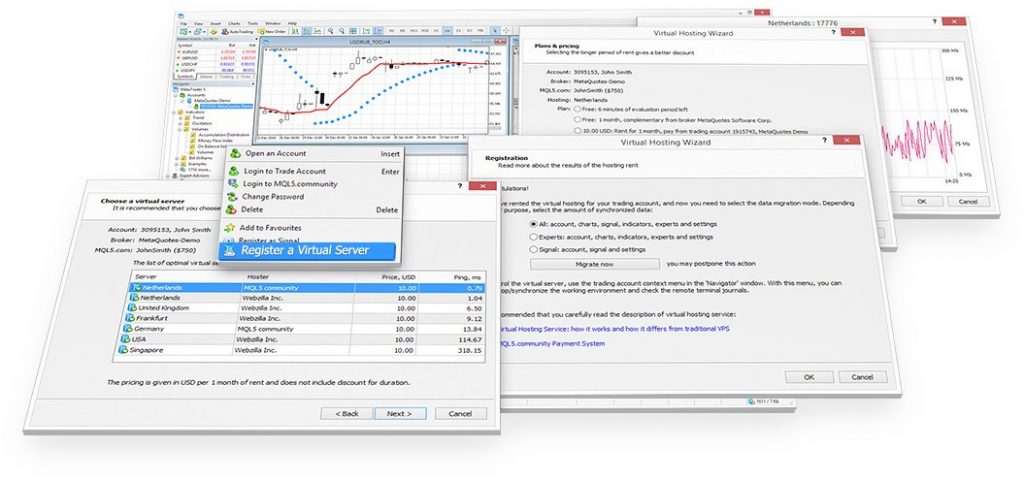Brokers With VPS



A virtual private server (VPS) allows clients to host their trading operations on a reliable, high-speed platform. But with sometimes expensive subscription costs, this article explains how brokers with automated VPS hosting work, the benefits and risks, plus compatible trading setups. We also list the top brokers with VPS services in 2026.
Brokers With VPS for United States






What is a Virtual Private Server?
A virtual private server, or VPS, is basically a cloud-based computer hosted in a data centre. Importantly, they provide traders with a stable internet connection and ultra-fast access to the financial markets, preventing delays and technical errors. And because a VPS facilitates permanent access to the internet, automated trading strategies can be left to run around the clock.
A virtual private server offers many of the benefits of shared and dedicated web hosting, including ample storage, advanced computer processing, extensive RAM and unlimited bandwidth. Clients essentially rent an extremely reliable and secure terminal from which to execute sophisticated trading strategies. Brokers with VPSs are particularly popular with intraday traders looking to speculate on short-term price fluctuations where every second counts.

Virtual Hosting on MT4
Benefits of Virtual Private Servers
There are several advantages to trading through a VPS:
- No hardware: With all trades taking place on a dedicated server, success and reliability are not dependent on the investor’s computer and hardware setup. This means power cuts, viruses or a drop in internet connections won’t interfere with trading strategies. It also means investors with low-power computers can still run several trading accounts and expert advisors simultaneously.
- Faster trades: High bandwidth means that server latency is kept low, ensuring that trades can be executed immediately. This can help reduce slippage while protecting profit margins.
- Automated trading: Trading with a VPS means that you don’t need to be sat at home on your computer all day. Instead, you can host an expert advisor on the virtual private server, leaving it to monitor the markets and execute trades 24/7.
Drawbacks of Virtual Private Servers
There are also some downsides to brokers with VPS services:
- Expensive: You usually have to rent a VPS from a third party. This can be expensive, especially for high-quality, reliable services that can cost around $100 per month. Some brokers may claim their own VPS is free, but the cost will likely be made up elsewhere, for example, commissions and payment fees.
- Suitability: While trading with a VPS makes sense for active, automated trading strategies, longer-term manual investors may not get as much value. For profits made over many weeks or months, immediate and around the clock order capabilities aren’t as essential.
- Getting started: When trading via a third-party VPS, you need to integrate the server with your online broker. This requires first checking compatibility requirements and then following often complex instructions. Of course, the top providers help make it a relatively smooth process, but beginners may find it time-consuming.
How to Start Trading With a VPS
Choosing a Broker
Trading through a virtual private server is a big commitment in terms of setup time and cost. With that in mind, it is worth comparing the best brokers with VPS services. Consider the following factors:
Price
The subscription cost for the VPS is one of the most important considerations. Fees will reduce your total profits so if you don’t plan on making many trades, a lower-cost server may suit your needs. Entry-level options start at around $10 per month. Also bear in mind that prices increase when you need more CPU and RAM.
Reviews
The best way to know how good a VPS is before using it is by reading customer reviews and ratings. Check whether traders employing similar strategies in comparable volumes found the virtual private server reliable and efficient. You should be able to find opinions on popular social media websites, including Reddit, Discord, Telegram and Facebook.
Capabilities
How much memory, RAM and CPU does the server offer? Traders using sophisticated algorithmic strategies may need ample amounts of each while lower-volume investors likely won’t need such large requirements. A semi-active swing trader, for example, may not need a top of the market virtual private server.
Customer Support
While issues relating to a VPS are unlikely, a broker with an accessible support team can prove invaluable. If your strategy goes haywire and you need to make prompt changes, a responsive customer service team could save you money. The best brokers with VPS services are contactable 24/7 via live chat, social media and phone hotlines.
Compatibility
Check that the VPS is compatible with your online broker, trading platform and expert advisor. If you have a preferred platform, such as MetaTrader 4 or MetaTrader 5, find a virtual private server that syncs smoothly with the terminal. The top providers, including MetaQuotes, also provide detailed guides and tutorials for new traders.

Setting Up Your VPS
To set up your virtual private server, follow these steps:
- Check the VPS is compatible with your broker’s trading terminal – speak to the support team if you are unsure
- Using a remote desktop application, input the IP address given to you by your broker. You will need to be connected to the internet
- Enter your trading account username and password into the remote desktop application
- Once connected to the server, log in to your platform and start trading
Bottom Line on Brokers With VPS
Brokers with VPSs are perfect for active investors looking to employ automated trading strategies. A virtual private server assures a permanent and reliable connection to the internet, meaning you don’t need to worry about losing market access during periods of volatility. The additional computing power also means users can operate multiple trading accounts and strategies simultaneously. Use this guide to brokers with VPS services to get started today.
FAQ
How Can I Find Out About A Broker’s VPS?
Most brokerages publish details of their virtual private server on their website. This should include information on pricing, performance levels and hardware requirements. You can also get in touch via the customer support team if you have specific questions.
Are Virtual Private Servers Secure For Trading?
The top firms offer highly secure VPS solutions. With that said, it is worth checking that both the brokerage and VPS provider utilise sufficient safety measures. The key element to look out for is protection against a distributed denial of service (DDoS) attack as these can interfere with the ordinary flow of traffic to a server.
Do VPS Brokers Permit Multiple Accounts?
Most brokers with VPSs allow their clients to host multiple accounts on servers. It will usually be the performance of your virtual private server that will limit the number of active accounts that can be managed and operated. VPSs with low bandwidth and RAM, for example, might not be able to handle too many accounts. If you wish to set up several expert advisors (EAs), you may want to rent a high-power VPS.
How Expensive Are VPSs?
The cost of trading through virtual private servers depends on the broker and the performance of the server you are renting. Low-cost options start at $10 per month while the most powerful VPSs are around $100. Make sure you consider the impact on your potential returns to justify the expense.
Which Are The Best Brokers With VPS Services?
Some of the best brokers with VPSs include IC Markets, FBS and AvaTrade. Also do your own research to find a broker that best meets your needs. The brand you sign up for will help shape your trading experience, so it’s worth exploring different options and tools beyond a virtual private server.
